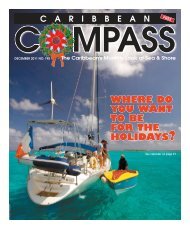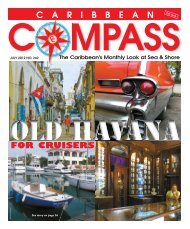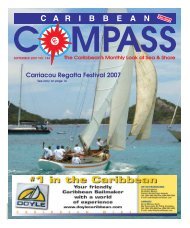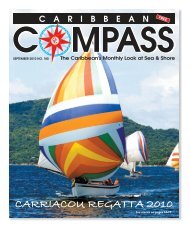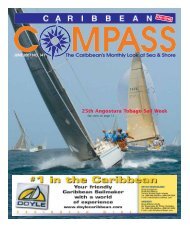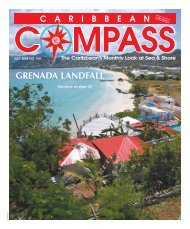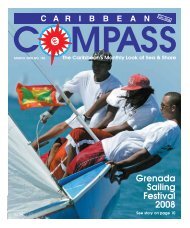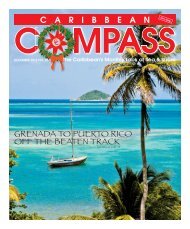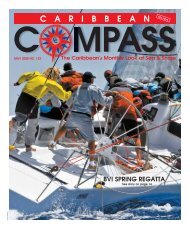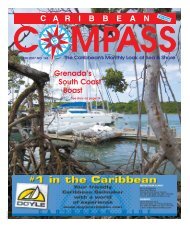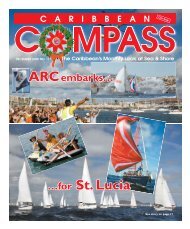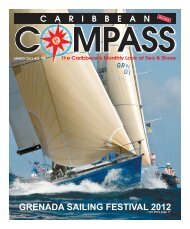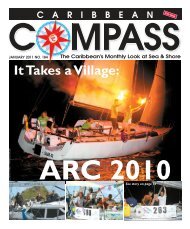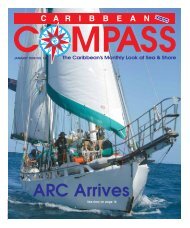You also want an ePaper? Increase the reach of your titles
YUMPU automatically turns print PDFs into web optimized ePapers that Google loves.
— Continued from previous page<br />
And, in the case of changing the notification location<br />
and/or date, using an Internet café means violation of<br />
the law that requires us to stop at Customs first before<br />
any other errands.<br />
The software itself is relatively easy to use, although<br />
there are some unnecessary steps and data fields, as<br />
outlined above. But the process does not make clearing<br />
in any easier, faster, more efficient or add value, as<br />
has been touted in past press releases. As we quoted<br />
to our teams and each other in past lives, “If one automates<br />
an inefficient manual system without improving<br />
the process that goes along with it, they end up with<br />
an inefficient automated system.”<br />
All this is not to say that the process itself lacks<br />
room for improvement, but someone knowledgeable<br />
in process management must be involved to<br />
spot the bottlenecks and suggest appropriate<br />
changes. This is a very specialized skill not available<br />
from most individuals.<br />
Melodye Pompa<br />
S/V Second Millennium<br />
Dear <strong>Compass</strong> Readers,<br />
The following letter appeared in the February <strong>2009</strong><br />
issue of <strong>Compass</strong>. Denis Webster has since received a<br />
reply from the Trinidad & Tobago Ministry of Tourism,<br />
which he would like to share with other readers. It follows<br />
his letter.<br />
CC<br />
Open Letter to the Ministry of Tourism<br />
Republic of Trinidad & Tobago<br />
Dear Minister,<br />
We have just recently departed your country and<br />
wish to bring to your attention a matter of concern to<br />
my wife and I.<br />
We have made many visits to your country since<br />
1994, but I fear this will be our last. We have always<br />
enjoyed the people of Trinidad & Tobago and the many<br />
sights of the islands, while sailing our yachts Tiger Lily<br />
and Tiger Lily II. Your facilities are most impressive.<br />
However, dealing with officials has become so onerous<br />
that we will not be returning.<br />
Instructions for departure provided by the Trinidad<br />
& Tobago Customs and Excise officials at the<br />
Chaguaramas boarding station were both contradictory<br />
and confusing. My wife and I are committed to<br />
complying with the regulations of the countries that<br />
we visit as guests. However, after three visits to the<br />
Chaguaramas office to obtain outbound clearance, at<br />
9:00PM we were told to leave at 10:00PM. These clearance<br />
procedures, of course, are determined by the<br />
clearing official. We were most concerned and nervous<br />
about departing through the Boca in the dark because<br />
of several incidents of piracy in that area over the past<br />
few months.<br />
The incident, however, which finalized our decision<br />
not to return to Trinidad, was what we viewed as the<br />
unprofessional conduct of the two Customs officials<br />
who made derogatory comments about my name and<br />
asked, “What kind of a name is that?” Such rude comments<br />
are not what might be expected from government<br />
officials.<br />
Minister, I provide this information for your attention<br />
and action.<br />
Denis Webster<br />
Yacht Tiger Lily II<br />
Dear Mr. Webster,<br />
I refer to your letter to the Minister of Tourism dated<br />
January 19, <strong>2009</strong>, regarding the unprofessional conduct<br />
and the offensive behaviour of two of our<br />
Customs Officials. Please be assured that we will<br />
investigate your complaint, as we place great importance<br />
on the conduct of our public officers and the<br />
welfare of our visitors.<br />
Your complaint will give us the opportunity to remedy<br />
any problems that exist.<br />
Please accept our sincerest apologies for any distress<br />
this situation may have caused you and your wife.<br />
Yours faithfully,<br />
Mrs. Melba Dedier<br />
Permanent Secretary<br />
Ministry of Tourism<br />
Trinidad & Tobago<br />
Dear <strong>Compass</strong>,<br />
When the air-floor in our new Avon inflatable began<br />
leaking around the valve, we began bracing ourselves<br />
for a long warranty slog with Avon. We remembered<br />
the nightmare it was extracting warranty repair from<br />
Bombard in the past, and now Bombard, Zodiac and<br />
Avon are the same company.<br />
We were wrong. Seagull Inflatables in Falmouth<br />
Harbour, Antigua, repaired our Avon floor and we were<br />
able to retrieve it the very next day. Seagull courteously<br />
informed us that they would deal with Avon.<br />
That kind of service is worth writing home about.<br />
So now you know where to go if you need inflatable<br />
work done or your life raft checked in and<br />
around Antigua.<br />
Gerard Lacroix<br />
Veronique Briand<br />
S/V Walita<br />
Dear <strong>Compass</strong> Readers,<br />
To all thinking of buying a wind generator: what is<br />
more important than how much power it puts out is<br />
how silent it is. Before buying a wind generator, contact<br />
sailors who have already purchased that model<br />
and ask how quiet it is. Many are silent, some make<br />
bearable noise, and with others the noise is unbearable<br />
and they must be shut down when it blows over<br />
20 knots. The Ampair 100 that once was on the top of<br />
Iolaire’s mizzenmast was dead silent. Even when we<br />
were surviving Hurricane Hugo off St Martin in 1989<br />
(the anemometer at the airport was registering 70<br />
knots before it blew away), the Ampair 100 only gave a<br />
buzz. We have now installed an Ampair 400 and have<br />
been pleasantly surprised. Iolaire has been laid up<br />
ashore but I have been on board working when it was<br />
blowing a full gale, certainly gusting 50 knots, yet all<br />
one could hear was a gentle hum. Check carefully<br />
before buying, as if silent a wind generator is wonderful,<br />
but if noisy it can vary from being bothersome to<br />
insufferable.<br />
Don Street<br />
Iolaire<br />
Dear <strong>Compass</strong>,<br />
Henry Hugh Smith asked my wife and me to join him<br />
at Rodney Bay, St. Lucia for two weeks aboard Drum<br />
Horse II to make a leisurely passage south to the<br />
Grenadines. We departed about 1400 hours to try to<br />
pick up a buoy between the Pitons in the Soufriere<br />
Marine Management Area, but were too late to find one<br />
of the obligatory mooring buoys between the Pitons.<br />
Anchoring is prohibited, so an obliging boat boy<br />
escorted us a mile north to Malgretout, close to the<br />
Harmony Beach Restaurant (13°50.5N 61°03.8W).<br />
There he passed us a buoy near to the shore and took<br />
our stern line to the shore, where he passed it to the<br />
local coconut salesman who, also requiring his cut of<br />
EC dollars for helping us to moor, leapt up.<br />
Just before dusk, a local fishing boat appeared from<br />
nowhere. Other men on shore secured the end of a net.<br />
The fishing boat pulled the net along our starboard<br />
side and looped it around our bow encircling our<br />
mooring buoy. There was almost continuous shouting<br />
in the local patois. The fishing boat then laid the net,<br />
heading towards the shore on our port side and passed<br />
the end ashore. Drum Horse, her mooring buoy and<br />
line ashore, was all encircled by the net held to the<br />
surface by a succession of small buoys.<br />
“Let go your mooring buoy,” they shouted. “This is<br />
an emergency!” Our skipper thought otherwise and<br />
radioed the Park Ranger who had passed by to collect<br />
our dues before the fisherman arrived. “Let go your<br />
mooring line,” shouted a swimmer by our bow. “We are<br />
calling the Park Ranger,” I replied. “No need for that;<br />
just let go your mooring buoy, only for five minutes!”<br />
Meanwhile the circumference of the net was closing in<br />
on us as the fishermen ashore pulled in the slack.<br />
The Park Ranger appeared. The empty outer mooring<br />
was untied from its sinker and passed with much<br />
shouting to the Park Ranger who seemed a bit unhappy.<br />
He then arranged for the fishing boat to drop an<br />
anchor to seaward of the net and pass its rope over the<br />
net to us. We then slipped our line to the mooring<br />
buoy, several swimmers submerged this under the<br />
net, up it popped outside the net; we were reattached<br />
to the mooring buoy over the top of the net. However<br />
Drum Horse was still imprisoned within the net<br />
stretching round her bow and down both sides to the<br />
shore 30 yards behind us. The Park Ranger, who was<br />
obviously unnerved by the presence of so many fishermen,<br />
departed, and the net slowly closed in on us.<br />
By this time it was dark and we wondered what<br />
would happen next. The bight of the net was tight<br />
under our bow. The sides of the net slowly moved along<br />
the sides of the boat to the front of the keel (the boat<br />
draws 7’6”) to the skeg-supported rudder and then the<br />
line of net buoys appeared across our stern. It reminded<br />
me of the conjuror demonstrating that no wires held<br />
his suspended companion aloft. There were several<br />
swimmers about, some with air tanks, so they must<br />
have skillfully manoeuvred the net under the hull.<br />
Someone shouted, “We will tie the net to your stern<br />
and be back in the morning,” and passed a line onto<br />
our stern, considerably adding to our skipper’s fury.<br />
This was supposed to be a peaceful anchorage in a<br />
State Park; no doubt fishing in such a place was prohibited;<br />
we had paid our mooring fee and the boat boy<br />
and the coconut salesman; we had been shouted at,<br />
un-moored, ensnared in the net, swum under and<br />
used as a mooring for the net.<br />
Next morning at dawn the fishermen returned in several<br />
boats and, with a considerable shore party, proceeded<br />
to empty the net. We had hoped to see a catch<br />
of biblical proportions but the major part of the catch<br />
seemed to be half a sack of small fish; perhaps the<br />
shore party also carried away some part of the catch.<br />
We never did discover what sort of fish they were after<br />
but they had made a very good job of catching Drum<br />
Horse before cleverly letting her out of their net. Our<br />
quiet evening had been rudely, and somewhat alarmingly,<br />
disturbed. It is believed fishing in the Marine<br />
Management Area is illegal and the Park Ranger certainly<br />
seemed frightened of upsetting the fishermen.<br />
—Continued on next page<br />
Marine<br />
Insurance<br />
The insurance business has changed.<br />
No longer can brokers talk of low rates.<br />
Rather, the honest broker can only say,<br />
“I’ll do my best to minimize your increase!”<br />
There is good insurance, there is cheap<br />
insurance, but there is no good cheap<br />
insurance. You never know how good<br />
your insurance is until you have a claim.<br />
Then, if the claim is denied<br />
or unsatisfactorily settled,<br />
it is too late.<br />
I have been in the insurance business<br />
48 years, 44 with Lloyds, and my claims<br />
settlement record cannot be beat.<br />
Fax DM Street<br />
Iolaire Enterprises (353) 28 - 33927<br />
or e-mail: streetiolaire@hotmail.com<br />
www.street-iolaire.com<br />
MAY <strong>2009</strong> CARIBBEAN COMPASS PAGE 39



